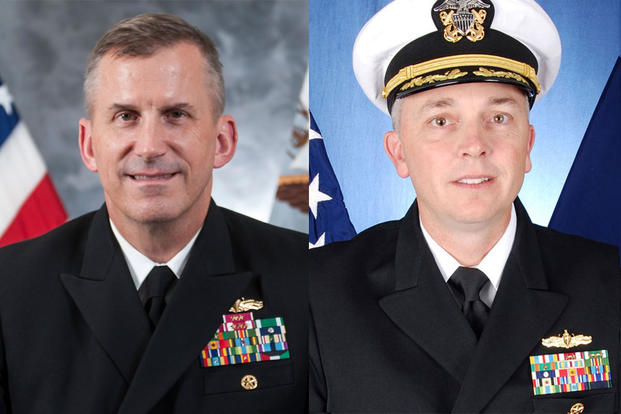More leaders are being removed from their posts as the Navy continues to investigate the cause of two deadly ship collisions in the Pacific this summer that resulted in the deaths of 17 sailors.
Vice Adm. Phil Sawyer, commander of U.S. Seventh Fleet, on Monday relieved two senior officers: Rear Adm. Charles Williams, the commander of Task Force 70, and Capt. Jeffrey Bennett, commander of Destroyer Squadron 15. The officers were relieved due to a loss of confidence in their command, according to a brief announcement from U.S. 7th Fleet.
Rear Adm. Marc Dalton, currently commander of Task Force 76, will take command of Task Force 70, which oversees theater surface warfare and integrated air missile defense for 7th Fleet in the Pacific. Capt. Jonathan Duffy, deputy commander of DESRON 15 will take command of the squadron, officials said.
Related content:
- Why Are Navy Ships Colliding in the Pacific? Experts Weigh In
- Navy Dismisses 7th Fleet Commander After Warship Accidents
- CNO Orders Operational Pause, Review After Latest Ship Collision
Both destroyers involved in the recent collisions, the USS John S. McCain and the USS Fitzgerald, belonged to DESRON 15.
For Sawyer, the firings are effectively his first public act as commander of the 7th Fleet; on Aug. 23, he abruptly assumed the command after Vice Adm. Joseph Aucoin, the previous commander, was relieved from his post by Pacific Fleet Commander Adm. Scott Swift just days after the second deadly ship collision.
USNI News, which broke the news of the most recent officer firings early Monday morning, also reported that the commander of Naval Surface Forces, Vice Adm. Thomas Rowden, had recently requested retirement about two months earlier than planned amid the recent disasters, which appear to amount to a massive scandal and embarrassment for the Navy, as well as the most significant tragedy of its kind in decades.
A spokesman for Rowden did not immediately respond to a Military.com query.
A Sept. 7 hearing before panels of the House Armed Services Committee about the two ship collisions focused on troubling recent findings from the Government Accountability Office showing that forward-based ships in the 7th Fleet did not have adequate time for training, and that many were operating with expired certifications.
"I personally made the assumption, and I have made the assumption for many, many years that our forward-deployed Naval force in Japan was the most proficient, well-trained, most experienced force we had, because they're operating all the time.," Vice Chief of Naval Operations Adm. Bill Moran told lawmakers during the hearing. "It was a wrong assumption, in hindsight."
The causes of the two ship collisions are still under investigation and are the subject of two separate additional reviews: one led by the head of Fleet Forces Command, Adm. Phil Davidson, that examines training for surface warfare officers and pre-deployment requirements and training; and another led by Navy Secretary Richard V. Spencer using outside experts to assess opportunities for institutional change in the Navy.
Spencer and Chief of Naval Operations Adm. John Richardson are set to appear Tuesday before the Senate Armed Services Committee to discuss the recent disasters.
-- Hope Hodge Seck can be reached at hope.seck@military.com. Follow her on Twitter at @HopeSeck.




























